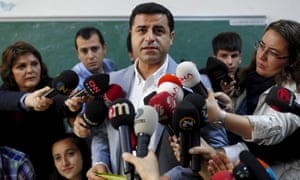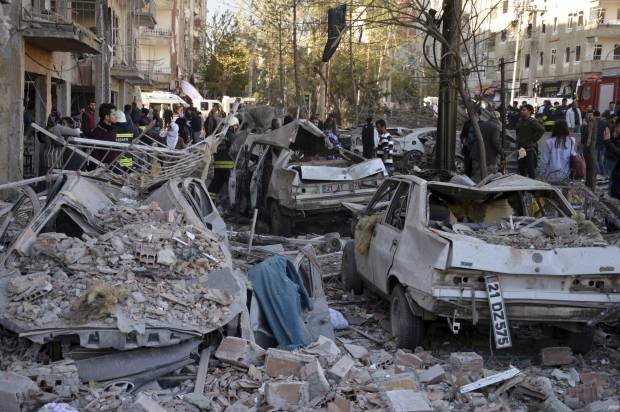
The two joint leaders of Turkey’s pro-Kurdish Peoples’ Democratic party (HDP) have been detained along with at least 10 MPs because of their reluctance to give testimony for crimes linked to “terrorist propaganda”.
Police raided the Ankara home of co-leader Selahattin Demirtaș and the house of co-leader Figen Yüksekdağ in Diyarbakır, the largest city in Turkey’s mainly Kurdish south-east, early on Friday.
Demirtaş – a charismatic leader known as the “Kurdish Obama” by some admirers – and Yüksekdağ had been targeted by several separate investigations over the past few months but this is the first time that either has been detained.
At least 10 other HDP parliamentarians were also held, lawyers said, in a major escalation of the government’s crackdown on its opponents in the wake of the failed coup on 15 July. Raids also took place in the south-eastern cities of Van and Bingöl.
The raids took place against a backdrop of rising criticism over the government’s purge, which earlier this week also saw the issuing of arrest warrants against editors and staff of Cumhuriyet, the main opposition newspaper in the country, and a fresh round of dismissals in the gendarmerie.
Ankara accuses the HDP’s politicians of harbouring sympathies for, and acting to further the interests of the Kurdistan Workers, party (PKK), a separatist group engaged in an insurgency against the government. Peace talks collapsed last year amid accusations that the PKK was rearming and as the ruling Justice and Development party (AKP) drifted towards allying with the nationalist bloc in parliament.
The purges of the police and media institutions are part of a crackdown on what the authorities say are individuals and organisations with alleged links to Fethullah Gülen, a US-based preacher that Turkey accuses of masterminding the coup.
The prime minister, Binali Yıldırım, told reporters that elected officials who incite and encourage terrorism must face legal proceedings and that the MPs were detained because they had refused to give testimony.
But Turkey’s allies are likely to perceive the latest arrests as a further attempt by President Recep Tayyip Erdoğan to consolidate his power ahead of a parliamentary vote and referendum expected as early as next spring to revise the Turkish constitution and transform the country from a parliamentary democracy into a presidential system.
The leader of the nationalist bloc, Devlet Bahçeli, recently backed a referendum, making a vote on the issue more likely.
A widespread difficulty in reaching social media websites such as Twitter and Facebook as well as messaging app WhatsApp was also reported across Turkey after the detentions started at midnight.
Hours after the detentions began, Diyarbakır was rocked by car bomb outside a police building that was blamed by authorities on PKK militants. Eight people were killed.
Others detained included the prominent MP, Sırrı Süreyya Önder, who in the past has been a pointman for contacts with jailed PKK leader Abdullah Öcalan. The head of the HDP’s delegation in the Turkish parliament, İdris Baluken, was also held.
HDP is the third largest party in the 550-seat Turkish parliament, with 59 seats. Parliamentarians in Turkey normally enjoy immunity from prosecution, but the pro-Kurdish party’s immunity was lifted this year.
Turkey accuses the HDP of links to the PKK, which is deemed a terrorist organisation by the US, the EU and Turkey.
Police also raided the party’s head office in central Ankara. Television images showed party officials quarrelling with police during the raid, and a witness said police cars and armed vehicles had closed off the entrances to the street of the HDP headquarters.
“HDP call international community to react against Erdoğan regime’s coup,” the party said on Twitter, referring to President Erdoğan.
A group of protesters chanting slogans tried to reach the party offices, but were stopped by police before they could enter the street, a witness said.
Relations with the EU are delicate. Officials in Ankara accuse their European counterparts of not showing enough support for Turkey in the aftermath of the failed coup, and bristle at criticism of the crackdown. Meanwhile, a deal to limit the flight of migrants from Turkey to Europe in exchange for visa-free travel for Turkish citizens in the EU may fail in the coming weeks because Europe has not kept its end of the bargain.
A measure to reintroduce the death penalty is also likely to be debated in the coming weeks in parliament, a likely death blow to Turkey’s EU accession talks.
The raids come as Turkey remains under a state of emergency imposed after the coup, which critics say has gone well beyond targeting the plotters. Thirteen staff from the opposition Cumhuriyet newspaper, including the editor-in-chief, were detained on Monday, further heightening strains in Turkish society.
Tensions have surged in the Kurdish-dominated south-east of Turkey since a fragile ceasefire declared by the PKK collapsed in 2015. The HDP seeks to promote the cause of Turkey’s Kurdish minority and defend the rights of Kurds as well as those of women, gays and workers.
But the authorities accuse the party of being a front for the PKK and failing to distance itself from terror, claims it has always vehemently denied.
Erdoğan has launched repeated personal attacks on Demirtaş, who analysts have seen as the sole politician in Turkey who comes anywhere near to rivalling his charisma. Demirtaş has made it a personal crusade to oppose Erdoğan’s plan for a presidential system in Turkey, which the HDP says would lead to dictatorship.
Reuters and Agence France-Presse contributed to this report.
[Source:-The Guardian]





